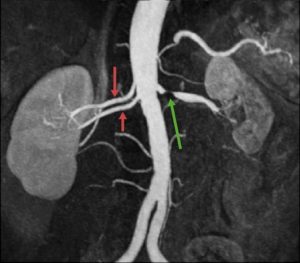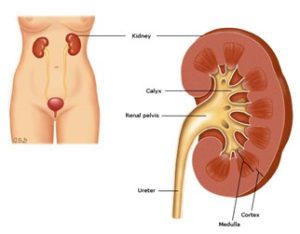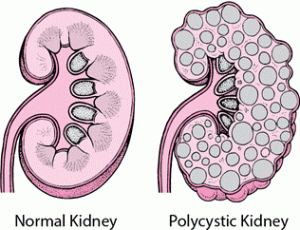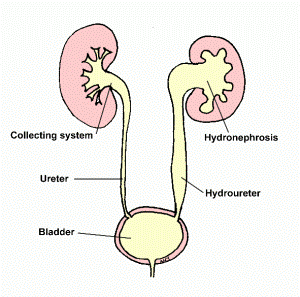There are 7 causes of CKD
Keep track of your kidney data with PKB
Key Points
- CKD is not a diagnosis. It is a syndrome with 7 common groups of causes (diagnoses)
- The most common (30%) ’cause’ is unknown; often with small kidneys on an ultrasound
- The most common known cause is diabetes (20%)
- It is important to diagnose a glomerulonephritis (kidney inflammation) as many are controllable
- It is important to diagnose obstructive nephropathy (blocked kidneys) as it is often reversible
- Many patients have more than one cause. I.e. the ’cause’ is multifactorial.
Even though there are 100s of causes of CKD, most people have one of 7 common causes of CKD. But some of these are really groups of causes (diagnoses), with sub-types within them. It is important to find out the cause as this will affect the treatment.
Note. Some people have more than one cause of CKD. For example, it is quite common for people with diabetes to have diabetic kidney and renovascular disease.
So. What causes chronic kidney disease (CKD)? Here are the 7 major causes:
1. Unknown
This is the most common ‘cause’ of CKD, affecting 30% of people who have CKD. It is not really a cause, this is just a general name given to all the patients who do not have a specific cause of their CKD.
In these ‘unknown cause’ patients, the kidneys have become small and scarred over the years. For this reason, some doctors call it ‘small kidneys’. It is presumed to be something you are born with, or a late stage of some of the other causes below.
2. Diabetes
Both Type 1 and Type 2 Diabetes can affect the kidneys. It is called diabetic nephropathy or diabetic kidney disease. It is the second most common cause, affecting 20% of people with CKD. An increased amount of protein in the urine is characteristic (common) with this condition. It usually comes on at least after ten years of having had diabetes.
Click here to find out more about how diabetes affects the the kidneys.
3. Renovascular disease (‘RVD’)
This is a common cause in older people, especially if they have smoked. It is also known as renal artery stenosis (RAS = tightening of main artery to the kidney, and/or its larger branches).
It is due to slow, long term build up, termed ‘furring’ up (with cholesterol and fat etc) of the main blood vessels (arteries) to the kidneys. It is similar to other diseases that are caused by ‘furring’ up of blood vessels, e.g. heart attacks, and strokes.

Renal angiogram (image showing the blood vessels), where you can see that the kidney on the right of the image is much smaller due to the lack of blood supply caused by stenosis at the green arrow.
Even though the affected kidney is on the right of the image, this is the patient’s left kidney! You might also notice that the right kidney (on the left) has two renal arteries where we would usually expect one. This is a normal variant that around 25% of people have.
4. Chronic glomerulonephritis (‘GN’; glo-mer-u-low-nuh-FRY-tis)
This is an inflammation of the kidney’s filtering units (glomeruli; filtering units; one million in each kidney). These are in the outer zone of the kidney called the cortex which you can see on the image below.
There are 7 subtypes of Glomerulonephritis. All these subtypes are considered an ‘auto-immune’ disease, i.e. something has aggravated the body’s immune (defence) system, and the own body’s immune system is attacking the glomeruli within the kidney.

Urinary tract (kidneys, ureter, bladder and urethra) showing outer (cortex) and inner (medulla) zones of the kidney.
Many of these GNs (Glomerulonephritis) are treatable if caught early so its especially important not to miss the diagnosis.
5. Polycystic kidney disease (PKD)
This is the only common inherited kidney disease. With this condition there are thousands of cysts in both kidneys, which are present from birth. It is not only a kidney disease, as it does affect other parts of the body.
This includes cysts in the liver, and can cause other abnormalities in the heart and brain. If you have it, so will 50% of your children. Please make sure your family are screened ( checked) for this condition if Polycystic kidney disease is present in your family. Speak with your GP.

6. Obstruction of the urinary tract (kidneys, ureter or bladder)
Both kidneys have to be blocked by something for this to cause CKD. Common causes of blockage include an enlarged prostate (in a man) and some pelvic cancers (especially in women). Obstruction is the most treatable cause of CKD. So it is very important to make the diagnosis
Note. Kidney stones rarely block both kidneys, so rarely cause CKD.
 Blockage of left kidney
Blockage of left kidney
Blockage of the left kidney and ureter (tube from the kidney to the bladder). As the other side is not blocked, CKD would not occur.
7. Chronic tubulointerstitial disease (TID)
An inflammation of the kidney’s tubules and surrounding structures. These are in the inner zone of the kidney called the medulla. It is a group of diseases with several causes, including:
- Reflux Nephropathy (or ‘reflux’) – a condition that causes urine to back up into your kidneys, and cause recurrent urine and kidney infections. This affects women more than men, and can be inherited in a complicated way.
- Drugs – e.g. Aspirin and similar drugs (NSAIDS) or Lithium
- Sarcoidosis (and other rare kidney diseases we do not really understand).
How do these diseases cause CKD?
That is a good question. We do not know how most of the above diseases cause CKD. There is a lot of research going on into this issue.
What does not cause CKD?
There is a lot of false information out there on this issue. Here are some things that do not usually cause CKD:
- Drinking too much or too little fluid
- Simple (called essential) high blood pressure (BP). Even though most people with CKD have high blood pressure, the reverse is not true, i.e. most people with simple high BP do not have CKD
- Simple (including recurrent) urine or kidney infections
- Kidney stones.
Summary
We have described what are the 7 causes of CKD. That ‘unknown’ is the most common cause is, perhaps, not surprising. For many common non-kidney diseases, it is also the case.
Top Tip
If you have CKD and diabetes, do not assume diabetes is the cause. It may well be. But make sure the doctors look for other treatable causes. Make sure you have a kidney ultrasound.
Last Reviewed on 21 June 2024
